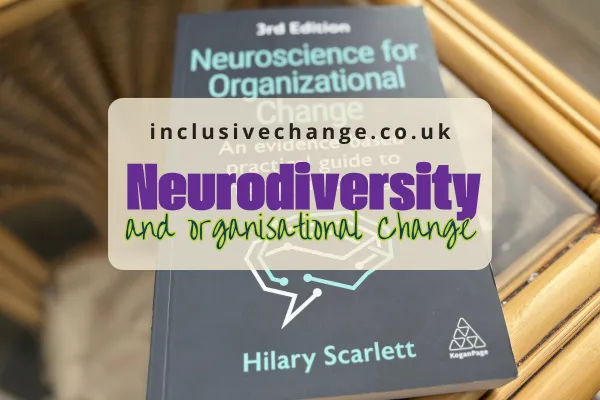Inclusive Change
Start the conversation
Read our blogs and discover more about neurodiversity through our links


Psychological safety in change
Change doesn’t just shake up structures and systems, it unsettles people. For neurodivergent employees, the emotional impact of organisational change can be profound, particularly when psychological safety is lacking or inconsistently applied.
In the final part of this blog series, based on an interview I gave published in Neuroscience for Organisational Change with Hilary Scarlett we explore why psychological safety must be sustained through change, and why managers and leaders carry a particular responsibility to protect and promote it. Without this foundation, even the most inclusive strategies can unravel.
Psychological Safety Is Not a One-Off Effort
Psychological safety means being able to speak up, share concerns, or show vulnerability without fear of judgment or consequence. It is a prerequisite for innovation, collaboration, and inclusion, and it is especially crucial for neurodivergent employees, many of whom may have experienced misunderstanding, exclusion, or stigma in previous roles.
When change arrives, the dynamics shift. Project leads may foster safe environments during the transition, but what happens when they leave? If a new manager replaces a psychologically safe leader with a more rigid or less empathetic approach, the sense of safety can collapse overnight.
For a neurodivergent person who has disclosed a diagnosis, raised concerns, or taken interpersonal risks, this shift can be deeply damaging. Trust is fragile. Once broken, it takes more than policy to repair.
The Manager’s Role in Navigating Neurodivergent Needs
Managers are on the front line of change. They don’t need to know the diagnoses of their team members, but they must be attuned to signs of struggle, and ready to respond constructively. That means asking thoughtful questions, not making assumptions.
A well-intentioned manager might notice someone disengaging and assume they are resistant. But if that person is dealing with the loss of their work routines, or has lost access to the tools that supported their performance, what looks like resistance may be exhaustion or anxiety.
One common misunderstanding relates to Rejection Sensitivity Dysphoria (RSD), which is particularly prevalent among people with ADHD. Even neutral feedback or a change in tone can trigger an outsized emotional response. A neurodivergent employee might suddenly leave a meeting, not from aggression but to avoid crying or showing visible distress, behaviour that could be misread if not understood through the right lens.
Managers must be trained to navigate these subtleties. They need the language, the empathy, and the tools to differentiate between behavioural issues and unmet needs. This isn't a one off awareness session but might look like a peer support or coaching network for managers or access to an experienced coach for your team when you are going through change programmes.
Designing for Safety, Not Just Compliance
Psychological safety cannot be left to chance. It must be built into the culture of change, not bolted on. This can mean:
Establishing regular, non-judgmental check-ins during periods of change
Offering a range of communication channels for feedback or concerns
Normalising conversations about different work styles, regardless of disclosure or sharing needs
Training leaders in neuroinclusive communication, empathy, and support strategies
A Foundation in Neuroscience
In Neuroscience for Organizational Change, Hilary Scarlett outlines the neurological need for control, predictability, and social connection. Psychological safety supports these needs, and its absence can trigger fight, flight, freeze, or fawn responses, particularly in neurodivergent individuals.
The book provides powerful insights into how leaders can design change in a way that works with the brain, not against it. For any organisation looking to make inclusion real, it’s an essential resource.
Order your copy at Kogan Page and use code NEW20 for 20% off your first purchase.
Embedding Lasting Change
At Inclusive Change, we work with organisations to embed psychological safety and neuroinclusion into the heart of their change programmes. From leadership coaching to ND audits and bespoke training, we help leaders shift from awareness to action.
To find out how we can support your team, visit inclusivechange.co.uk
Check out Lucy's other features

A Journey of Neurodiversity Advocacy and Change
Read Lucy's interview with Golden Valley, where she explains some of the life events that led her to becoming a full time advocate for neurodivergent and disabled people in the workplace.

Women in the Middle® Entrepreneurs:
EP #52: Sharing the Positives About Neurodiversity with Lucy Smith
Suzy Rosenstein, a master life coach, hosts a podcast called Women in the Middle Entrepreneurs, a podcast where these important conversations about the intersection of being a midlife entrepreneur who's also a woman 50 plus can happen.
Inclusive Change Ltd
The Brightwell, Bradbury House
Wheatfield Drive
Bradley Stoke, Bristol
BS329DB
Copyright 2025 - Inclusive Change Ltd
Companies House: 12412464
VAT NO: 352 1564 17
ICO Reg: ZB081779
UK Register of Learning Providers: 10090652
Reg no: 12412464





